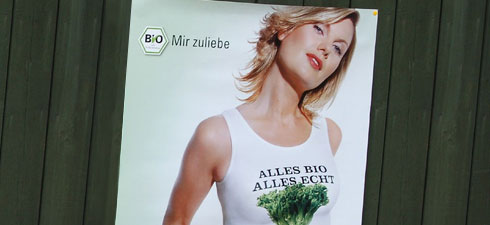Food cooperatives are based on a simple principle: they pool consumers’ purchasing power, thereby boosting demand. Since food co-ops can buy hefty quantities of organically-grown produce, farmers and wholesalers like Bioland or Rapunzel are willing to slash their prices. And by joining forces, co-op members not only save money, they create an alternative to the alienating experience of the supermarket.
The dream of affordable organic food for all
The pioneers of the food co-op movement began making their dream of inexpensive organic food for everyone come true back in the 1970s. The idea spread fast throughout Europe. Though new co-ops have since sprung up all over Germany and England, they are yet a viable alternative to supermarket chains in France. That said, consumers in rural regions of France can often buy freshly-harvested produce straight from farmers anyway. The idea is the same: organic foods are better for people, and cheaper if purchased directly from producers.
Even in this age of the organic craze, whose pitchmen even put the organic seal on kiwis flown into Europe from South Africa, the food co-op credo remains revolutionary: food-growing should spare natural resources and protect the environment. So what ends up on the plates of co-op members should be free from harmful substances and produced according to ecological standards. However, the German Food Cooperatives Association (Bundesarbeitsgemeinschaft der Lebensmittelkooperativen e.V.) is also fighting for pesticide-free foodstuffs on High Street, not just in the cellar storerooms of food co-ops. Hence its efforts to help Joe Bloggs change his consumption habits. Top-of-the-list priorities include minimising packaging and long-haul shipments as well as favouring regional and seasonal produce. After all, we can live without oranges imported from Spain and pineapples from Brazil.
On-demand supply prevents overproduction
Tom Albrecht, spokesman for the German Co-ops Association, has the impression that food co-opers are often “people with more time than money”. The more affluent health food fans tend to do their shopping at wholefood shops. “But food co-ops are the more ecological variant,” argues Albrecht: only they can meet their members’ demand spot on. And the more local suppliers in the loop, he points out, the shorter the hauls: farmers and wholesalers who work with food co-ops usually deliver the collective consignments to a central site that is easily accessible to all. Wholefood shops, in contrast, always have to turn a profit, so they are compelled to carry even very slow-selling groceries.
A ’68 brainwave bears fruit
The way food co-ops are set up still smacks a little of the 1970s: they rely on members to volunteer their time and energy. Daniela, an ethnology student from Münster, does her part by receiving consignments at home. She divvies up the goods among the members, who drop in one after another. This private food co-op in Münster has even developed an online ordering system. Members can fill their shopping baskets – and pay their bills – on the website. After having wired an initial deposit, each member can order to their heart’s content, charging the costs against their personal account – though no-one checks their accounts. So the private food co-op system is built on mutual trust: anyone who wants to join has to introduce himself in person to the other members – and show up at the meetings as regularly as possible.
If you show a genuine interest in the co-op and a sincere commitment to ecology, you can then look forward to fresh vegetables every week from a nearby farm and even bread from the organic bakery. In the month of September, for instance, you are likely to find kohlrabi, mushrooms and fennel in your shopping basket, along with blackberries and organic pretzels. The obligatory pineapple might be missing – but it won’t be missed at the sight of the cornucopia of regional delights in your basket.
Lukas Ley and Lilian Maria Pithan
Was this article useful? If so we are delighted!
It is freely available because we believe that the right to free and independent information is essential for democracy. But this right is not guaranteed forever, and independence comes at a cost. We need your support in order to continue publishing independent, multilingual news for all Europeans.
Discover our subscription offers and their exclusive benefits and become a member of our community now!












